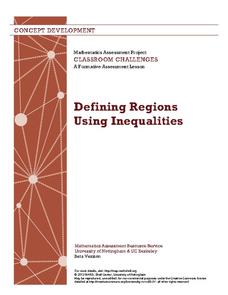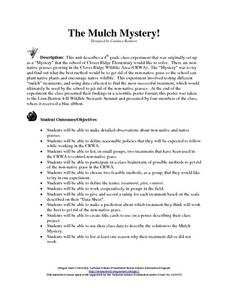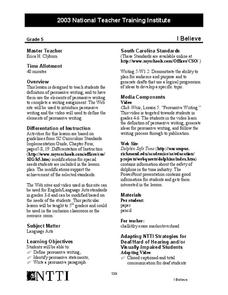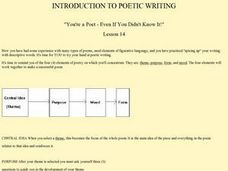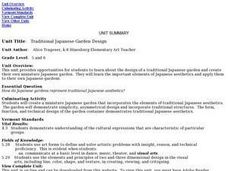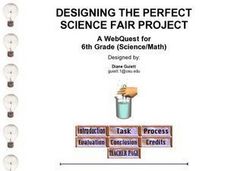National Institute of Open Schooling
Periodic Table and Atomic Properties
An in-depth lesson, the fourth activity in a series of 36, begins with teaching how the periodic table's arrangement came to its current design. Using this knowledge, pupils then move on to analyze the arrangement of elements to their...
Curated OER
A Separate Peace: Chapter 9 Reading And Study Guide
Pupils define 3 vocabulary words, define 1 literary term, and respond to 10 short-answer questions pertaining to chapter 9 of A Separate Peace by John Knowles. These activities are designed to help them better understand the novel and...
NASA
Connecting Models and Critical Questions
Scholars use data to analyze and determine which sets of information need to be counted. They create a model to explain differences among chemical elements using graphs to prove concept mastery.
MARS, Shell Center, University of Nottingham
Defining Regions Using Inequalities
Your young graphers will collaboratively play their way to a better understanding of the solution set produced by the combining of inequalities. Cooperation and communication are emphasized by the teacher asking questions to guide the...
Curated OER
The Mulch Mystery!
Fourth graders make a detailed observations about non-native and native grasses. They define reasonable policies that they expect to follow while working in the CRWA. Students list, in small groups, two treatments that have been used in...
Curated OER
Of Mice and Men: Chapter 3 Reading and Study Guide
Boost comprehension with an excellent reading guide for chapter 3 Of Mice and Men. Learners define four vocabulary words, note one allusion, define five literary terms, and respond to 31 short answer questions regarding the...
Curated OER
Out of the Dust: Background notes about the novel, The Great Depression, and The Dust Bowl
If your class is reading the historical fiction novel, Out of the Dust, then you are in luck. Here are a few slides that will help you provide historical context for the book, as well as define main characters, setting, symbolism, and...
Curated OER
Design Your Own Rube Goldberg Machine
Students design and construct a Rube Goldberg machine that accomplishes a simple task in at least ten steps. They view and discuss various Rube Goldberg designs, identify types of simple machines, and in small groups produce a schematic...
Curated OER
Theatre Prop Design and Construction
Fourth graders construct individual props. In this theatrical arts lesson plan, 4th graders use the elements of art to create various props using paper mache. Students construct objects such as logs, fruit, and a picture frame.
King Country
Lesson 9: Communication - Day 2: Assertiveness
Appropriate assertive and non-verbal assertive communication is the focus of this lesson designed for the special education classroom. Using mirrors, class members practice assertive responses to a variety of situations.
Curated OER
An Electronic Self-Portrait Lesson Plan - A Unit for Middle School
Using a photo of themselves for inspiration, learners create a multi-media self-portrait. A digital image of each child is taken, it is uploaded into the computer where is can be experimented with in a digital format. Young artists then...
Curated OER
Identifying Personification in Poetry
Improve your young poets' descriptive writing with this lesson on personification. A SMART board and PowerPoint presentation guide your class through the process of identifying human qualities attributed to various non-human objects. A...
University of North Carolina
Argument
What elements make up a successful argument? A helpful resource describes aspects of an argument such as the claim, evidence, counterargument, and audience. Perfect as an individual assignment for a flipped lesson or collaborative work,...
Georgia Career, Technical, and Agricultural Education
World of Fashion — Vocabulary Worksheet
Make sure your fashionistas know how to talk about all the latest and oldest styles. Partners work together to define 18 fashion-related terms, ranging from style to home furnishings. Definitions are included on the second page of the...
Curated OER
I Believe
This lesson is designed to teach students the definition of persuasive writing, and to have them use the elements of persuasive writing to complete a writing assignment. The Web site will be used to introduce persuasive writing and the...
Curated OER
I. M. Pei and the Geometry of the NGA
Students compare design elements in neoclassical and modern architecture. They review knowledge of triangles and quadrilaterals and design a geometric pattern using Pei's polygons They create a city plan using a variety of lines and...
Curated OER
We Are Colony! Settlement Design
Learners explore government systems. In this colonial America lesson plan, students consider colonial settlement needs as they design settlements that can sustain themselves and meet the needs of colonists.
Curated OER
Stable Structures
Consider what it means to create a stable structure. The words stable and structure are defined, then stable objects are depicted and discussed in terms of their design features. Learners are asked to design a photo frame that includes...
Curated OER
Symmetry in Kaleidoscope Designs
Students define reflection, rotation and symmetry. In this symmetry lesson, students move the graph around the coordinate plane and identify the line of symmetry. They identify the different designs of a kaleidoscope.
Curated OER
Metals, Non-Metals, Metalloids
Students describe properties of various elements. They arrange the elements based on properties in order to explain the organization of the periodic table. They label elements as metal, non-metal, or metalloid.
Curated OER
INTRODUCTION TO POETIC WRITING
Students read about the four elements of poetry: form, theme, purpose, and mood. They are given several questions to ask themselves about each element as they begin to write their own successful poems.
Curated OER
Traditional Japanese Garden Design
Students create a miniature Japanese garden that incorporates the elements of traditional Japanese aesthetics. They study the simplicity, asymmetrical design and incorporate traditional structures.
Curated OER
Designing the Perfect Science Fair Project Webquest
Sixth graders examine the Scientific Method and define their topic of interest. Students familiarize themselves with how to utilize their resources and create note cards. Students create their written report and display of their...
Curated OER
Spice Container
Sixth graders examine and identify classic Greek and Roman motifs on spice containers. They analyze the process of casting and chiseling silver, and design and create a spice container using classic Greek and Roman design elements.



